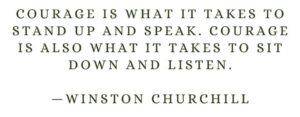 I don’t know about you but, I expect you share this experience. There are disputes I look back on and I wished I’d had the courage to step up to say what was on my mind. Then, there are those other occasions when I wish I had kept my mouth shut! In either case, I have considered that we also need compassion and dignity and self-respect to manage these situations well – whether to stand up or sit down reflects the most prudent choice.
I don’t know about you but, I expect you share this experience. There are disputes I look back on and I wished I’d had the courage to step up to say what was on my mind. Then, there are those other occasions when I wish I had kept my mouth shut! In either case, I have considered that we also need compassion and dignity and self-respect to manage these situations well – whether to stand up or sit down reflects the most prudent choice.
I agree with the quote though – it takes courage to do both! And the period of time to decide on which approach serves us and the other person best happens in a nanosecond. That split second requires us to refrain from reacting so that our responses ultimately come from a place that reflects the way we want our courage (and other signs of conflict mastery) to be manifested in that instant and instance.
Deciding to stand up for ourselves and others and express our truth with courage, or listen before responding and possibly not weighing in at all are choices we have in all our disputes. For this week’s Conflict Mastery Quest(ions) blog I suggest you consider a dispute about which you would like to explore these choices as you answer the following questions.
- What was the dispute about?
- When you look back, and consider the quote under the title of this blog, what was the choice you decided on – to speak or sit down?
- How did you choose that response?
- In what ways was it a good choice?
- In what ways might the other choice have more prudent?
- What makes it challenging for you to speak up if that’s the case- in general?
- What makes it challenging for you to sit down and listen if that’s the case- in general?
- If you had it to do this interaction again what else might you have said or done?
- What difference might that have made?
- Going forward, how might you decide which approach best suits the situation, the other person and you?
- What else occurs to you as you consider these questions?
- What insights do you have now that you didn’t have before you answered these questions?
(Popular – from the archives)


